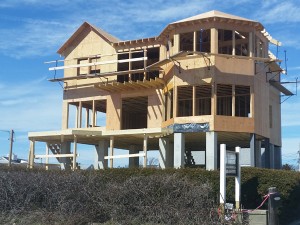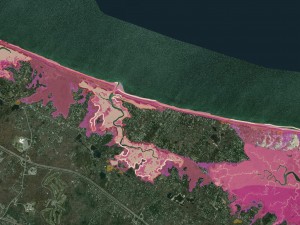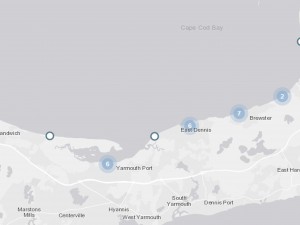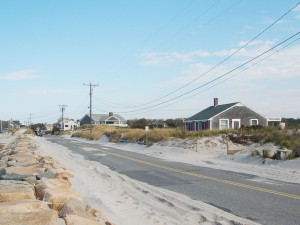Overview
In 2016, the National Oceanographic and Atmospheric Administration (NOAA) awarded a three-year, $780,000 Regional Coastal Resilience Grant to the Cape Cod Commission and partners to develop a tool and public outreach program to investigate the environmental and socio-economic effects of local and regional coastal resiliency strategies. The Regional Coastal Resilience Grant program supports regional-scale projects that enhance the resilience of coastal communities and economies to the effects of extreme weather, climate hazards, and changing ocean conditions. The Resilient Cape Cod project focuses on the effects of erosion, storm surge, and sea level rise.
Adaptation Strategies Database
The database is a collection of information on a broad range of strategies to increase resiliency on Cape Cod. Grant partners identified a total of 41 strategies, including nature-based solutions, structural solutions, and policy approaches, which were researched and classified based on their ability to protect, accommodate, or retreat from the impacts of erosion, storm surge, and sea level rise. The information was adapted into a full, excel-based matrix; fact sheets on individual strategies; and integrated into the decision support tool.
View the Adaptation Strategies Matrix and the Adaptation Strategies Fact Sheets.
Stakeholder Engagement
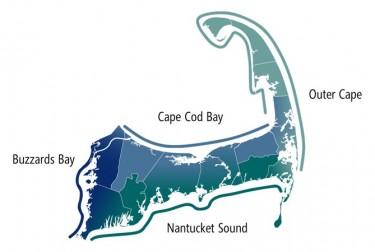
Stakeholders were engaged based on their connection to waters that surround Cape Cod.
Commission staff and grant partners worked with stakeholders across the region to improve understanding of the threats under projected climate and sea level rise scenarios, and impacts from erosion, and exploring options appropriate for Cape Cod communities.
Stakeholders were engaged in regions around Buzzards Bay, Cape Cod Bay, Nantucket Sound, and the Outer Cape. Over the course of three meetings in each group, Commission staff worked with stakeholders to understand coastal vulnerabilities, learn about adaptation strategies, understand local community values, and discuss how the project could help communities take action. An additional group focused on shaping tool development met following the subregional stakeholder outreach, as well.
Socioeconomic Analyses
Commission staff and consultants estimated the value of ecosystem services and the impact of projected climate change hazards and selected adaptation strategies on these values. The value of Cape Cod’s ecosystems, the influence of adaptation strategies on these ecosystems, and the impact of ecosystem services on property values in the region were considered and incorporated into the stakeholder process and decision support tool.
 Communication and Decision Support Tool
Communication and Decision Support Tool
The decision support tool, the Cape Cod Coastal Planner, communicates the impacts of coastal threats and adaptation strategies, including costs and benefits, and the need for action in a GIS-based tool that allows for user interaction. The Coastal Planner educates users on the climate change hazards impacting Cape Cod's coastline, the adaptation strategies available to address them, and implications for local infrastructure and ecosystems.
Visit the tool at www.capecodcoast.org.
Town of Barnstable Pilot Project
The Commission and grant partners conducted a pilot with the Town of Barnstable to test and implement the Cape Cod Coastal Planner. The community-based workshop process identified key climate-related hazards, vulnerabilities and strengths, and built on the Town's recent experience with the state's Municipal Vulnerability Preparedness program.
Staff
-
Erin Perryeperry@capecodcommission.org
-
Philip "Jay" Detjenspdetjens@capecodcommission.org
-
Danielle Donahuedanielle.donahue@capecodcommission.org
-
Heather McElroyhmcelroy@capecodcommission.org
